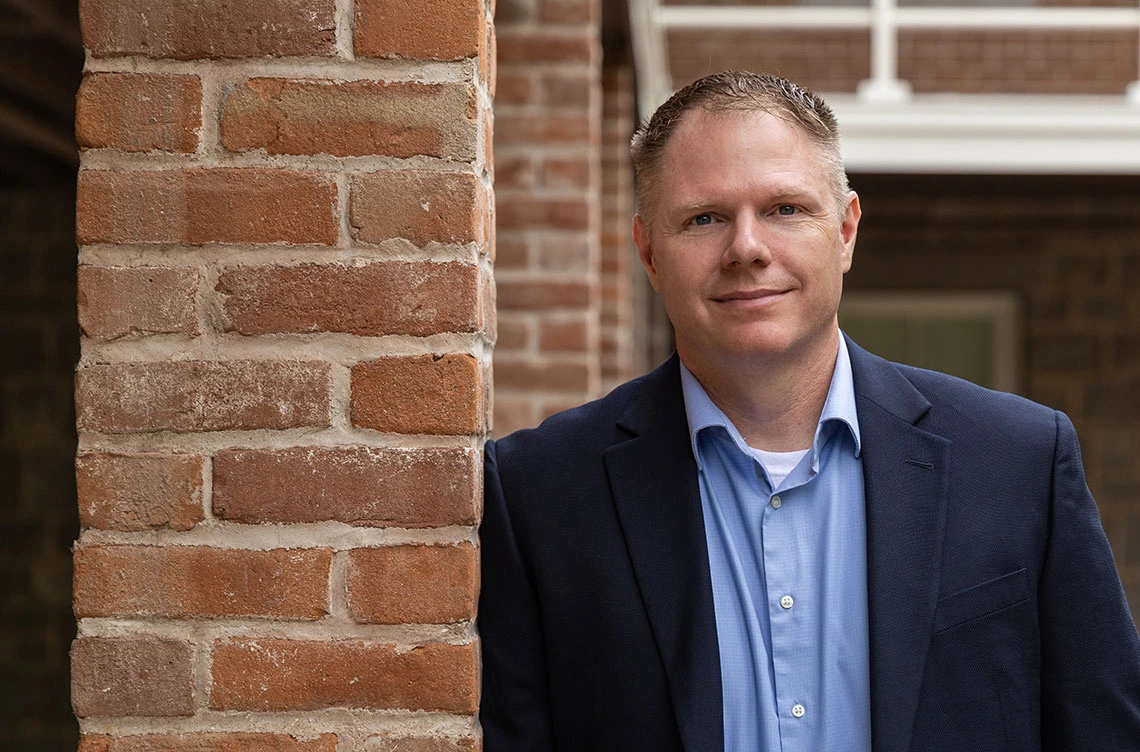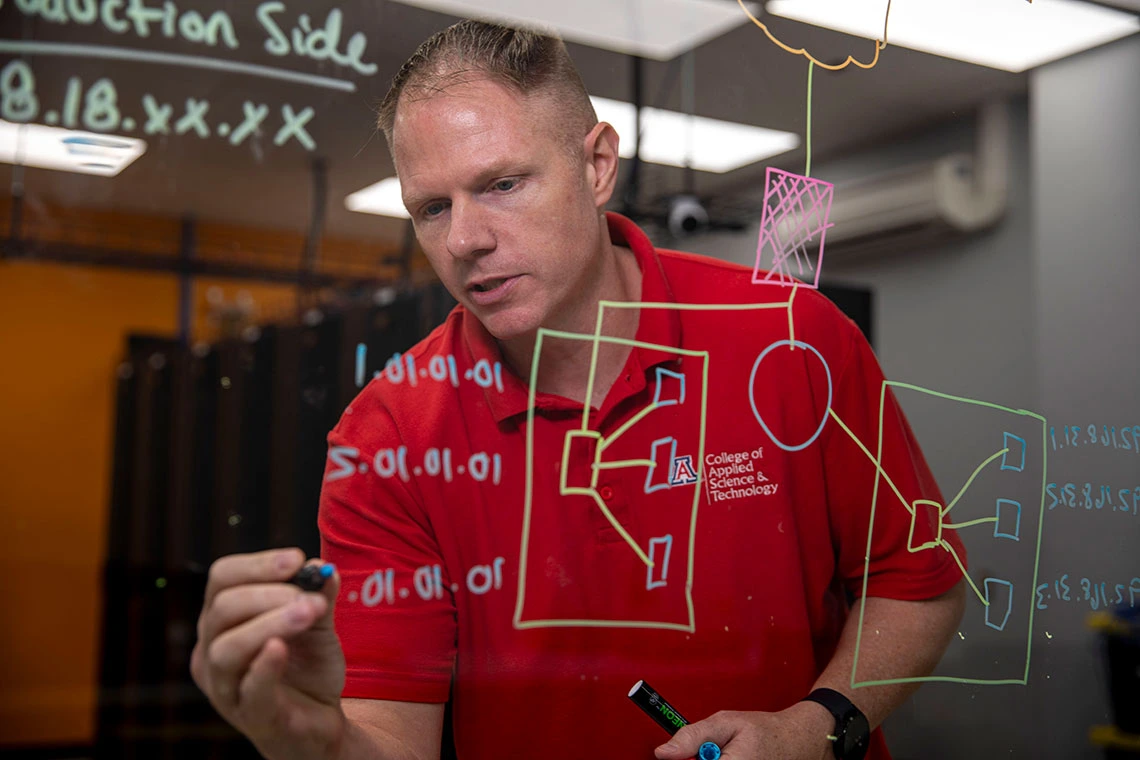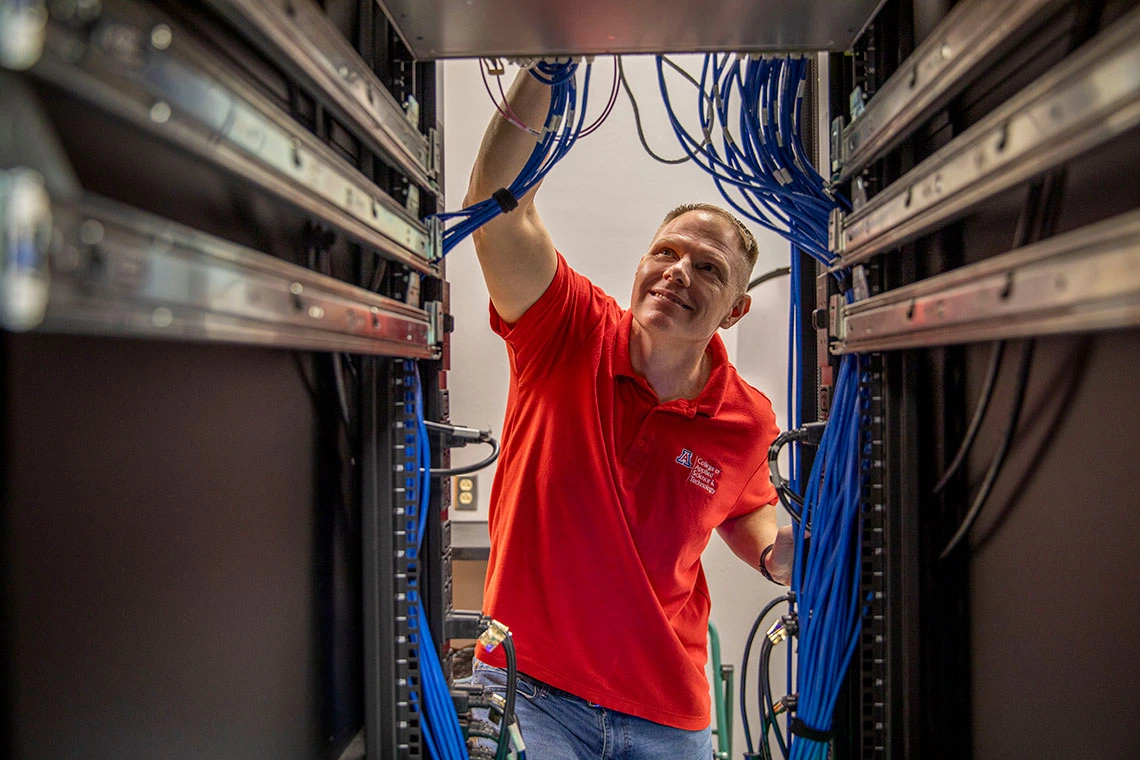Shaping the Next Generation of Cybersecurity Professionals: Paul Wagner, Professor of Practice

With a career spanning military service and applied technology, Professor of Practice Paul Wagner inspires the next generation of cybersecurity professionals at the College of Information Science. Photo by Molly Condit.
The U of A’s commitment to interdisciplinary collaboration and workforce development align directly with my passion for training skilled cyber professionals capable of meeting rapidly evolving threats.
A US Army veteran with two decades of service and a PhD in Cyber Defense from Dakota State University, Paul Wagner brings deep expertise in cyber defense, workforce development and applied learning to the University of Arizona’s top-ranked Cyber Operations program. As a professor of practice, he combines military, industry and research experience to prepare students for real-world cybersecurity challenges through hands-on teaching, research and the Arizona Cybersecurity Clinic.
What brought you to the University of Arizona?
After serving 20 years in the U.S. Army, I was ready to bring my operational experience in networking, cyber defense and global military communications into an academic setting where it could shape the next generation of cybersecurity professionals. The University of Arizona’s Cyber Operations program, with its strong focus on applied learning and national leadership in cybersecurity education, provided the perfect fit. The university’s commitment to interdisciplinary collaboration and workforce development aligned directly with my passion for training skilled cyber professionals capable of meeting rapidly evolving threats.
What is your current research, and what most excites you about this work?
My current research focuses on cybersecurity education and workforce development. This has led to several grants to support the development of the Arizona Cybersecurity Clinic, run summer camps for middle and high school students and create and deliver teacher professional development and education programs. What excites me most about this work is that it directly impacts the learner at all levels, provides them with the skills necessary to gain employment in the field and increases the pipeline of future cybersecurity professionals.

Professor of Practice Paul Wagner. Photo by Ryan Hunt.
Tell us about your work with the Arizona Cybersecurity Clinic.
The Arizona Cybersecurity Clinic is part of the Consortium of Cybersecurity Clinics, which provides cybersecurity services to under-resourced organizations while providing students with experiential learning opportunities. This allows students to apply what they learned by working with clients to provide critical cybersecurity services—providing real-world experience, developing their technical and professional skills and building teamwork and collaboration. It is great to be able to engage students with impactful projects for the community.
What are you teaching this year, and what do you most enjoy about teaching?
This year I am teaching the Cyber Warfare course and the Cyber Operations capstone aligned with the Arizona Cybersecurity Clinic. Cyber Warfare is a pentesting course that requires students to combine many skills, concepts and problem-solving to get through the course. Within the Cybersecurity Clinic capstone, students are required conduct in-depth research on organizations and their sectors to identify threats, risks and trends before conducting an overall risk assessment for the organization. I enjoy teaching these courses due to their in-depth, hands-on. I also appreciate seeing the growth of the students as they work through the courses.
How do you bring your military experience and research into your teaching?
My background as a military communications officer and chief information security officer provides practical knowledge in building and defending complex networks and assessing organizational risk. This experience allows me to translate those lessons into the classroom.
My research on cybersecurity education frameworks and workforce development work roles also shapes my courses. My goal is to emphasize hands-on labs, professional certifications and experiential learning opportunities to ensure students have the practical experience and confidence to obtain employment.

Professor of Practice Paul Wagner. Photo by Ryan Hunt.
Tell us about your proudest moments from working in higher education.
My proudest moments in higher education are when students reach out to update me about getting into graduate programs, obtaining their first or new job or providing general updates on their lives.
Beyond research and teaching, what are your passions?
I love to travel—the ability to see the world, experience cultures and share those opportunities with my kids. Most recently we went to Alaska, where we took a helicopter ride up to a glacier to visit a dog-sledding camp and were able to interact with the dogs and go sledding.
What advice do you have for InfoSci students?
Be open to opportunities to engage with your peers, mentors and the community. Networking is a critical component of obtaining employment in the field. Identify ways outside of your coursework to build your skills, which includes your technical, problem-solving and professional skills.
What does the InfoSci experience mean to you?
The InfoSci experience is about bridging knowledge and practice. It represents a community where students, faculty and collaborators work together to solve real-world problems through research and applied learning. Information science and cybersecurity connect society, business, policy and technology. The College of Information Science—and the experience it provides—is a launchpad for future leaders in cybersecurity.
Learn more about Paul Wagner on his faculty page, or explore ways you can support the dynamic, student-invested faculty of the College of Information Science.

